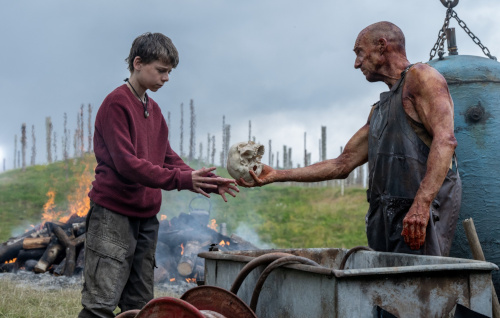
So after a couple of failed efforts, I finally saw 28 Years Later last night. I enjoyed it though the ending was, as so many have said, kinda weird. I am, however, willing to indulge that ending on the hope / assumption that the next film will make more sense of it. For now though, I just want to try and untangle my thoughts about it and lay out where I think it's going.
Danny Boyle has said this film is about family: that's not the impression I got. A lot of people have also commented on the satirical Brexit subtext. I can definitely see that, but I think (hope) it's actually going for something bigger. A sort of state of the nation statement. My reasons for thinking this are a bit fragmentary, so I suppose I'll just cite some things I noticed that I think are likely significant.
First of all, the fact the mother (and subsequently, the baby) is called Isla – Spanish for island. She is the personification of England. Then the doctor, talking about cancer, says he doesn't know if it started in the brain and spread to the breast (heart / soul) or started in the breast and spread to the brain. This is clearly a metaphor for the clear social malaise we're all so aware of in Britain: the ubiquitous mean-spirited and spiteful ethos embodied by the Daily Mail. Isla's cancer is the death of Old England, and baby Isla's unpromising birth, to an infected mother on a wrecked train, with all the rats fleeing, and later left at the gate of Holy Island in a shopping basket (possibly some tongue-in-cheek joke about Amazon deliveries) is England's future.
Secondly, the recurring sequences and references to medieval archers, specifically cinematic depictions of them. I think the shots of the Sycamore Gap are significant in this respect as for most people, the tree was best known for its appearance in Robin Hood, Prince of Thieves. I think these references to Robin Hood and the medieval yeoman archer are meant to invoke how the English imagine and see ourselves, in stark contrast to how the English are in reality: on the one hand, a mindless, rage-infected mob, spiralling into self-destruction; bloated, stupid, slug-like creatures that drag themselves through the dirt, subsisting on invertebrates (I can't help but see this as commentary on pop-culture consumerism)... and on the other, a backward, isolated community, living in fear, clinging to a dead past for comfort (notice here the portrait of the queen in the village hall, and the use of folk music at Spike's party – even the various references to rationing evokes a kind of nostalgia for the 1940s and 50s). The idealised story that the dad tells and everyone's eagerness to believe it, followed shortly by Spike's unease with this self-delusion, and him declaring that the whole thing is a lie. England's dreaming... as the Sex Pistols famously sang. Also, I think the use of the term Alpha for some of the infected cannot be anything other than an invocation of the manosphere bollocks. That is definitely deliberate. I'm not fully sure what the significance of that is though. I suspect it is less a comment on what is, after all, a very interweb phenomenon, and is more about self-serving populists, directing and controlling the mindless mob. The fact that an infected woman got pregnant is itself an interesting hint that there is still some sort of society among the infected, rather than just mindless homicidal rage across the board.
I have a tentative theory that the Ninja Savile's (as Budd kept calling them) are supposed to be emblematic of the state of youth and youth culture – specifically the terminally online, backward-looking, post-ironic retro shite strand of it. (Is the "Jimmy is coming down from the cloud" graffiti an internet reference? Not sure.) It was clearly significant, particularly as his dad was a vicar, that Jimmy was shown wearing the crucifix inverted, ie, as a Satanic symbol. Definitely getting edgelord vibes from them.
So overall, what I'm seeing is a story about social decay and crisis, and the various responses to that crisis, along with a critique of Britain's (or specifically England's) self-image, how we're all striving to live in the past in various ways, lacking any concept of a future. I am definitely on board with that story and I'm looking forward to the follow-up.